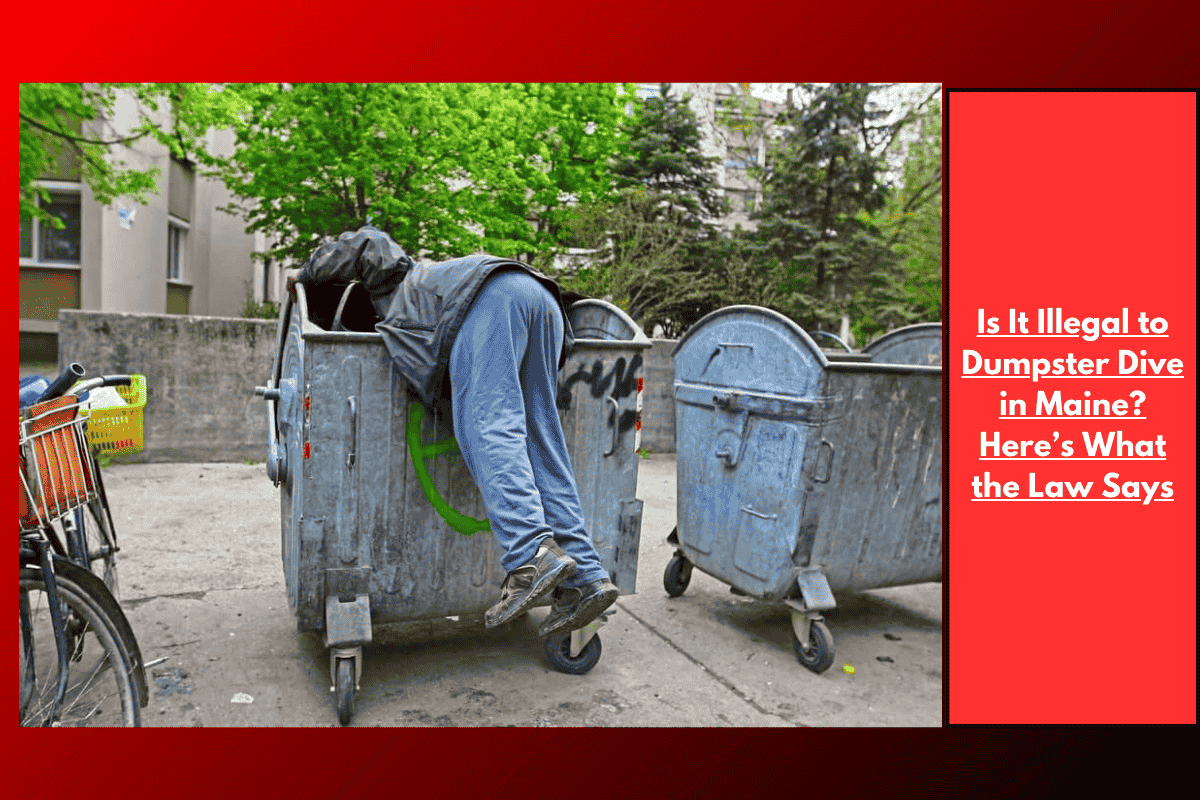Dumpster diving, or the act of searching through commercial or residential trash bins for discarded items, is a practice that raises many legal and ethical questions. If you’re considering dumpster diving in Maine, it’s important to understand the legal landscape surrounding this activity. While it may seem harmless, there are certain rules and regulations that could affect whether it is legal or not. Here’s everything you need to know about dumpster diving in Maine.
Is Dumpster Diving Illegal in Maine?
In Maine, dumpster diving is not explicitly illegal, but there are several laws and local regulations that may make it illegal or restricted in certain circumstances. Generally, the practice is not outlawed at the state level, but there are various factors to consider before diving into any trash.
Theft and Trespassing Laws
One of the main legal risks of dumpster diving comes from potential theft and trespassing charges. While the items in a dumpster may seem abandoned, they are still considered property of the person or business who owns the container. Therefore, taking items from a dumpster without permission could be considered theft. Additionally, if you enter private property or a commercial property to access a dumpster, you could be charged with trespassing.
Theft: In Maine, if you take items from a dumpster without the owner’s consent, you could be charged with theft, especially if the items still have value or are part of a business’s property.
Trespassing: If you enter private property to access a dumpster, this may be considered criminal trespassing. Even if the dumpster is outside, on a sidewalk, or near a store, you could still be violating trespassing laws if you are on private land without permission.
Municipal and Local Ordinances
In addition to state laws, local ordinances in Maine may regulate or restrict dumpster diving. Many towns and cities have ordinances that control waste management, property rights, and trash collection. Some municipalities may explicitly prohibit dumpster diving in certain areas, especially in commercial districts or near private residences.
For example:
Portland and other larger Maine cities may have specific ordinances about accessing trash bins or dumpsters. Always check with the local city council or municipal office to see if there are specific rules in your area.
Local waste disposal regulations: In some areas, local laws may require that waste is properly disposed of or protected from scavenging, so dumpster diving may not be allowed under these rules.
Health and Safety Concerns
Even if dumpster diving is technically allowed, there are important health and safety concerns to keep in mind. For example:
Food Safety: If you’re diving for food, be aware of the risks of contamination. Many foods in dumpsters may be spoiled, improperly stored, or exposed to bacteria, which can lead to foodborne illnesses. In Maine, it’s illegal to consume food that’s been improperly handled or exposed to unsanitary conditions.
Physical Safety: Diving into dumpsters can pose physical dangers. There may be sharp objects, hazardous materials, or dangerous debris inside the dumpster. Always be cautious and wear protective gloves and clothing if you plan to dive.
Environmental Considerations
Maine is known for its environmental consciousness, with strict waste disposal and recycling laws in place. While recycling and reducing waste are encouraged, dumpster diving can sometimes be seen as a violation of the state’s environmental regulations. For example, if a dumpster is labeled as “for recycling only,” taking recyclable items might violate waste management policies.
What You Can Do Legally
While dumpster diving may have legal restrictions, there are ways to engage in the activity legally and responsibly:
Get Permission: The best way to ensure that you’re not breaking any laws is to ask for permission from the property owner or business owner before diving into a dumpster.
Stick to Public Areas: Some public spaces may allow access to dumpsters as long as they are not marked as private property. However, avoid trespassing on private property.
Follow Local Ordinances: Be sure to check with local authorities for any restrictions or specific guidelines regarding dumpster diving in your area.
Protect Yourself: If you do decide to dive, wear gloves, protective clothing, and always be cautious about the items you are handling, especially when it comes to food.
Dumpster diving in Maine is not inherently illegal, but there are various risks and legal issues to consider. The most significant concerns are theft, trespassing, and violating local ordinances. To ensure you are engaging in this activity legally, always seek permission, stay within public areas, and be mindful of local regulations. By taking the necessary precautions and understanding the law, you can avoid potential legal issues and make the most of your dumpster diving experience.
SOURCES
[1] https://92moose.fm/is-dumpster-diving-legal-in-maine/
[2] https://mywaynecountynow.com/is-it-illegal-to-dumpster-dive-in-maine-heres-what-the-law-says/
[3] https://q1065.fm/illegal-to-dumpster-dive-in-maine/
[4] https://wcyy.com/is-dumpster-diving-legal-in-maine/
[5] https://www.greenmatters.com/sustainable-living/what-states-is-dumpster-diving-legal-in














